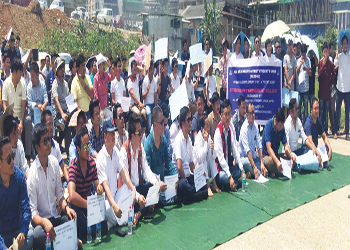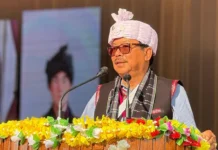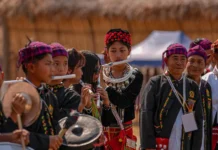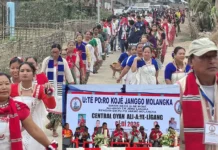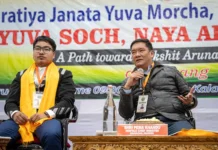[ Nellie N Manpoong ]
ITANAGAR, May 21: The All Arunachal Pradesh Students’ Union (AAPSU), under the aegis of the North East Students’ Organisation (NESO), held its sit-in protest against the Citizenship (Amendment) Bill, 2016, at the tennis court near IG Park here on Monday, and questioned the state governm-ent’s silence on the issue.
Joined by several district level organisations from across the state, student leaders and politicians expressed strong resentment against the bill and demanded its cancellation.
AAPSU general secretary Tobom Dai asserted that the union out-and-out rejects the bill. He termed the bill “anti-indigenous and anti-Northeast” and said it would, if implemented, have far-reaching ramifications in the state and the Northeast region.
“It seems that the Centre does not see beyond Kolkata and a minuscule population of around 14-15 lakh people means nothing to them.”
Dai informed that the AAPSU met with Chief Minister Pema Khandu last week, handed him a copy of the memorandum submitted to the Joint Parliamentary Committee in Guwahati, and urged the state government to take a stand as the Meghalaya government has done.
“He (Pema) said that he would discuss the matter with his cabinet colleagues, and we are still waiting to hear from the state government on the issue,” Dai said.
NESO coordinator Pritam Waii Sonam presented a brief on the contents of the bill, and also questioned the state government’s stoic silence.
He informed that the NESO along with its component units of apex student unions of the Northeast states would meet with Prime Minister Narendra Modi and all central ministers regarding the issue in its next phase of agitation.
Former AAPSU general secretary Biru Nasi, whose team had opposed the bill when it was first introduced in 2016, exhorted the people of the state to say no to the bill.
“This bill is completely against the rights of our indigenous people and each and everybody should say no to this. If you want to fight this, you have to fight this today. There is no point in crying tomorrow,” he said, and asked the AAPSU to continue the movement until the bill is scrapped.
AAPSU president Hawa Bagang urged the people of the state not to encourage Chakma and Hajong refugees by employing them. He also sought deletion of Chakma and Hajong names that have allegedly been included illegally in the electoral rolls in some parts of the state.
Representatives of political parties, Peoples’ Party of Arunachal president Kahfa Bengia, and the Indian National Congress’ West Siang district president M Basar also came out strongly against the bill, and assured that their parties would support the NESO and the AAPSU in their movement.
AdiSU president Nang Gao, Green Arunachal Foundation and NE Indigenous Human Rights Organisation representative Japon Lowang, former GSU president Damik Gameh, and former ANSU president Sikka Gapak also said they fully support the movement and would stand by the AAPSU and the NESO.
The protest also saw the support of hundreds of district student unions from across the state, besides the Rajiv Gandhi University Students’ Union and the RGU Research Scholars’ Forum.
Sit-in protests were held across the Northeast as the second phase of the agitation against the Citizenship (Amendment) Bill, 2016. The first phase was held at Digholipukhri in Guwahati on 12 May.
This daily made attempts to get a statement from the state government and the Bharatiya Janata Party regarding the issue, but did not receive any response.
Later in the day, members of the AAPSU submitted a memorandum to the governor, expressing opposition to the bill.
“We are of the clear opinion that the bill is an attempt to dump the burden of post-1971 Bangladesh liberation on the entire Northeastern states… Even if our state is not immediately affected by the bill, if it is approved and passed, it shall have large-scale ramifications for a 100-percent tribal state like Arunachal Pradesh. It shall definitely serve as a legal basis for furthering and legitimizing the claims of the Chakma and Hajong refugees as indigenous populace of the state. It shall also defeat the very purpose of the Bengal Eastern Frontier Regulation, 1873, and other regulations currently in force in Arunachal Pradesh,” the memorandum read.
The Citizenship (Amendment) Bill, 2016, proposes to amend the Citizenship Act of 1955 and make members of minority Hindu, Sikh, Buddhist, Jain, Parsi and Christian communities from Afghanistan, Pakistan and Bangladesh eligible for applying for Indian citizenship.

